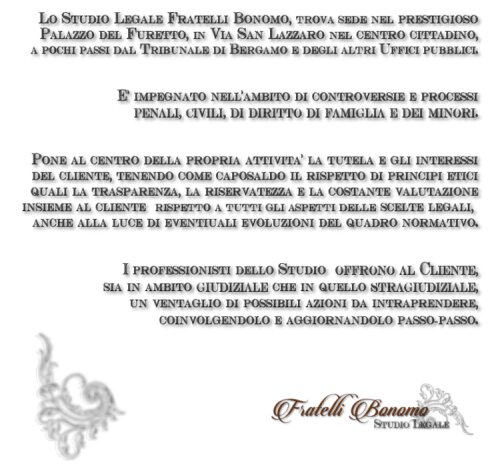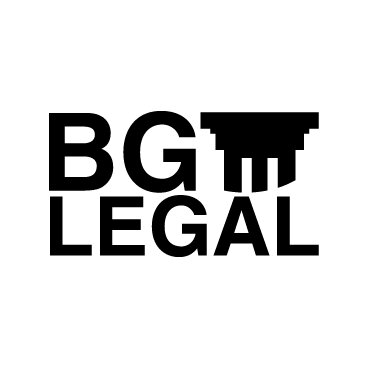Best General Litigation Lawyers in Bergamo
Share your needs with us, get contacted by law firms.
Free. Takes 2 min.
List of the best lawyers in Bergamo, Italy
About Litigation Law in Bergamo, Italy
Litigation describes the process of resolving disputes through the Italian court system. In Bergamo, a city in the Lombardy region of northern Italy, litigation typically concerns civil, commercial, or administrative matters. Depending on the dispute, proceedings might unfold in the Tribunale di Bergamo (the main courthouse for civil and criminal matters) or in specialized sections such as labor or family courts. Litigation can be complex, involving various stages from initial filing, pre-trial motions, hearings, mediation or conciliation attempts, to actual trial and potential appeals.
Why You May Need a Lawyer
There are several scenarios where securing legal assistance in litigation becomes crucial. Common situations include:
- Contract disputes between individuals or businesses
- Property and real estate disagreements
- Employment disputes, such as wrongful termination or unpaid wages
- Inheritance or succession conflicts
- Debt recovery and bankruptcy proceedings
- Liability claims, including personal injury or professional negligence
- Separation, divorce, and child custody issues
- Disagreements over commercial or administrative matters involving public entities
A lawyer can help interpret the law, collect evidence, represent your interests in court, and guide you through local procedures that can be intricate and time-consuming.
Local Laws Overview
Litigation in Bergamo is governed by Italian national law, mainly the Codice di Procedura Civile (Civil Procedure Code) for civil matters, but there are local rules and customs to consider. Key aspects include:
- Lawsuits must typically be filed at the competent local court, primarily the Tribunale di Bergamo, with jurisdiction based on subject matter and monetary value.
- Pre-trial mediation is required for certain disputes, including condominium, inheritance, family, banking, and property disagreements.
- Strict deadlines (prescrizione and decadenza) apply for bringing claims. Missing these can result in losing the right to have your case heard.
- Court fees must be paid ("contributo unificato"). The losing party is often ordered to pay the other side’s legal costs, though the judge can make different awards.
- Proceedings are conducted in Italian; having a lawyer who can represent you and communicate effectively with courts is critical, especially if you are not fluent in Italian.
- The process includes written briefs, documentary and oral evidence, witness testimony, and expert opinions where relevant.
- Appeals are possible but also subject to time limits and procedural formalities.
Frequently Asked Questions
What is the first step to starting litigation in Bergamo?
The process typically begins with the drafting and filing of a formal legal document (atto di citazione or ricorso) setting out your claim and the remedy you are seeking. This must be lodged with the competent court and served on the opposing party.
Do I need a lawyer to file a lawsuit in Bergamo?
Yes, for most civil cases, the assistance of a qualified Italian lawyer (avvocato) registered with the local Bar Association is required to present and argue your case.
How long does a court case usually take?
Timeframes vary widely depending on the complexity of the matter and the court’s caseload. A simple claim may resolve in months, while complicated cases can last several years including appeals.
Are out-of-court settlements common?
Yes, Italian law encourages parties to settle disputes amicably, often through assisted negotiation or mediation before or during litigation.
How are court fees calculated?
Court filing fees depend on the value of the claim and the type of proceedings. Your lawyer can provide an estimate in advance.
What language is the litigation conducted in?
All proceedings and documentation must be in Italian. If you do not speak Italian, a translator or a bilingual legal professional is essential.
What happens if I lose my case?
If you lose, you may be required to pay the court costs and, in most cases, the other party’s legal fees, unless the judge decides otherwise based on the circumstances.
Can foreigners initiate litigation in Bergamo?
Yes, non-residents and foreigners have the same rights as Italian citizens to access the courts, though some official documents may need to be accompanied by translations and legalizations.
Is legal aid available for those who cannot afford a lawyer?
Yes, there is an option called "patrocinio a spese dello Stato" that provides legal assistance in civil, criminal, and administrative litigation to qualifying individuals with limited income.
Is it possible to appeal a decision?
Most court decisions can be appealed to higher courts, but strict deadlines apply. An appeal must be based on procedural errors or incorrect application of the law.
Additional Resources
If you need further information or legal support regarding litigation in Bergamo, consider these resources:
- Ordine degli Avvocati di Bergamo - the local Bar Association that can assist in finding qualified lawyers
- Tribunale di Bergamo (Bergamo Court) - for procedural information and case status
- Comune di Bergamo (Municipality of Bergamo) - provides information on public mediation services
- Ministero della Giustizia (Ministry of Justice) - for national laws and procedures
- Punti di Accesso alla Giustizia (Justice Access Points) - public offices for assistance with court matters
Next Steps
If you believe you need legal support with a dispute in Bergamo, start by gathering all relevant documentation related to your case, including contracts, correspondence, and identification. Contact a local lawyer specializing in litigation who is registered with the Ordine degli Avvocati di Bergamo. They can assess your case, explain the process in detail, discuss likely costs, and represent you in negotiations or court proceedings. If you meet the financial criteria, ask about applying for legal aid. Acting quickly is important to ensure you do not miss any critical deadlines. Remember, early legal advice can significantly improve your chances of a favorable outcome.
Lawzana helps you find the best lawyers and law firms in Bergamo through a curated and pre-screened list of qualified legal professionals. Our platform offers rankings and detailed profiles of attorneys and law firms, allowing you to compare based on practice areas, including General Litigation, experience, and client feedback.
Each profile includes a description of the firm's areas of practice, client reviews, team members and partners, year of establishment, spoken languages, office locations, contact information, social media presence, and any published articles or resources. Most firms on our platform speak English and are experienced in both local and international legal matters.
Get a quote from top-rated law firms in Bergamo, Italy — quickly, securely, and without unnecessary hassle.
Disclaimer:
The information provided on this page is for general informational purposes only and does not constitute legal advice. While we strive to ensure the accuracy and relevance of the content, legal information may change over time, and interpretations of the law can vary. You should always consult with a qualified legal professional for advice specific to your situation.
We disclaim all liability for actions taken or not taken based on the content of this page. If you believe any information is incorrect or outdated, please contact us, and we will review and update it where appropriate.














